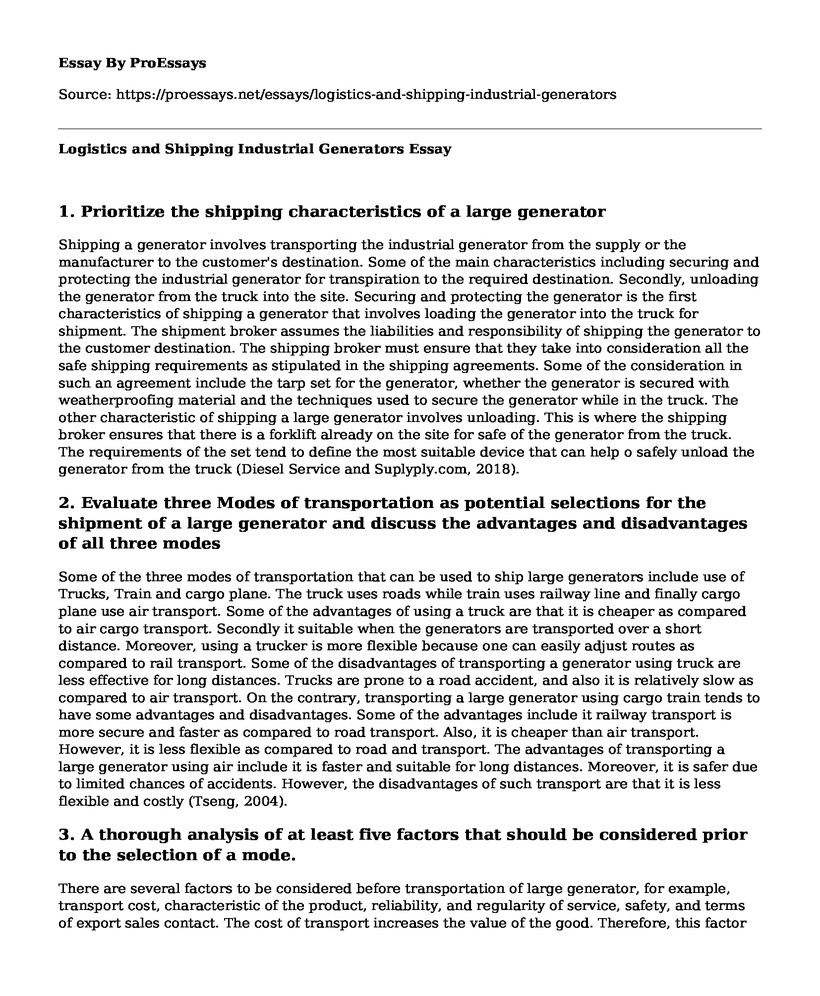1. Prioritize the shipping characteristics of a large generator
Shipping a generator involves transporting the industrial generator from the supply or the manufacturer to the customer's destination. Some of the main characteristics including securing and protecting the industrial generator for transpiration to the required destination. Secondly, unloading the generator from the truck into the site. Securing and protecting the generator is the first characteristics of shipping a generator that involves loading the generator into the truck for shipment. The shipment broker assumes the liabilities and responsibility of shipping the generator to the customer destination. The shipping broker must ensure that they take into consideration all the safe shipping requirements as stipulated in the shipping agreements. Some of the consideration in such an agreement include the tarp set for the generator, whether the generator is secured with weatherproofing material and the techniques used to secure the generator while in the truck. The other characteristic of shipping a large generator involves unloading. This is where the shipping broker ensures that there is a forklift already on the site for safe of the generator from the truck. The requirements of the set tend to define the most suitable device that can help o safely unload the generator from the truck (Diesel Service and Suplyply.com, 2018).
2. Evaluate three Modes of transportation as potential selections for the shipment of a large generator and discuss the advantages and disadvantages of all three modes
Some of the three modes of transportation that can be used to ship large generators include use of Trucks, Train and cargo plane. The truck uses roads while train uses railway line and finally cargo plane use air transport. Some of the advantages of using a truck are that it is cheaper as compared to air cargo transport. Secondly it suitable when the generators are transported over a short distance. Moreover, using a trucker is more flexible because one can easily adjust routes as compared to rail transport. Some of the disadvantages of transporting a generator using truck are less effective for long distances. Trucks are prone to a road accident, and also it is relatively slow as compared to air transport. On the contrary, transporting a large generator using cargo train tends to have some advantages and disadvantages. Some of the advantages include it railway transport is more secure and faster as compared to road transport. Also, it is cheaper than air transport. However, it is less flexible as compared to road and transport. The advantages of transporting a large generator using air include it is faster and suitable for long distances. Moreover, it is safer due to limited chances of accidents. However, the disadvantages of such transport are that it is less flexible and costly (Tseng, 2004).
3. A thorough analysis of at least five factors that should be considered prior to the selection of a mode.
There are several factors to be considered before transportation of large generator, for example, transport cost, characteristic of the product, reliability, and regularity of service, safety, and terms of export sales contact. The cost of transport increases the value of the good. Therefore, this factor should be considered. Cost can vary based on type and amount of goods that need to be transported. Characteristic of the commodity, for example, the size and weight play a role deciding the mode of transport to use. Sea and railway transport cater for heavy shipment while air provides mostly for light products. Also, transport mode differs in reliability and regularity. Resolution on which method to use will be influenced by the agency and speed by which the good is needed. Safety and security is also a crucial factor. For instance, water transport exposes product to the peril of sea or ocean, hence the riskiest. Last but not least are terms of the sales contract. The buyer may insist on which type of transport mode to use (Zhang & Lam, 2018).
4. A sound and specific recommendation for the shipment of the generator
The shipping of the generator in the case needs to follow some logistics to ensure that efficiency in the mode of transport used is achieved. The method of transportation used in transporting the machinery must put concern on the product concerning the conditions of the shipment. Time is a crucial factor in delivery, and such information is highlighted in the shipment documents. It is essential for a transporting company to countercheck the documents so that they are aware of the nature of the product that requires shipment to guarantee a mode of transport that ensures product safety from theft and damage while meeting the deadline of the delivery of the load. Constant communication with the owner of the shipment is crucial so that more guidance can be provided (Zhang & Lam, 2018).
References
Diesel Service and Suplyply.com.(2018). Logistics and Shipping Industrial Generators.Rerieved:http://www.dieselserviceandsupply.com/Logistics_and_Shipping.aspx
Tseng, Y. Y. (2004). The Role of Transportation in Logistics(Doctoral dissertation, University of South Australia).
Zhang, X., & Lam, J. S. L. (2018).Shipping mode choice in cold chain from a value-based management perspective. Transportation Research Part E: Logistics and Transportation Review, 110, 147-167. (Zhang & Lam, 2018)
Cite this page
Logistics and Shipping Industrial Generators. (2022, Mar 29). Retrieved from https://proessays.net/essays/logistics-and-shipping-industrial-generators
If you are the original author of this essay and no longer wish to have it published on the ProEssays website, please click below to request its removal:
- Outsourcing Logistics Functions
- E-Commerce and How It Transforms the Logistics in Companies
- Analysis of Maersk Neptune Collision Case Paper Example
- The Food Truck Business Questions and Answers Paper Example
- Essay Sample on Reaching Six Sigma Quality: Leveraging ERP for Quality Control
- Paper Example on Non-Emergency Transportation: Ensuring Access to Healthcare for Everyone
- Chief of Staff: Leading Proactively to Avoid Clogs & Losses







